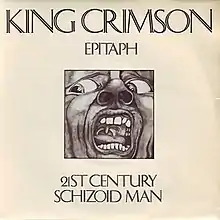21st Century Schizoid Man
"21st Century Schizoid Man" is a song by the progressive rock band King Crimson from their 1969 debut album In the Court of the Crimson King. Often regarded as the group's signature song, it has been described by sources such as Rolling Stone as "a seven-and-a-half-minute statement of purpose: rock power, jazz spontaneity, and classical precision harnessed in the service of a common aim."
| "21st Century Schizoid Man" | |
|---|---|
 UK single release | |
| Song by King Crimson | |
| from the album In the Court of the Crimson King | |
| A-side | "Epitaph" |
| Released |
|
| Recorded | 1, 20–21 August 1969 |
| Genre | |
| Length | 7:24 |
| Label | Island |
| Composer(s) | |
| Lyricist(s) | Peter Sinfield |
| Producer(s) | King Crimson |
Lyrical content
The lyrics of "21st Century Schizoid Man" were written by Peter Sinfield and consist chiefly of disconnected phrases which present a series of images. All three verses follow a set pattern in presenting these images. The song criticizes the Vietnam War with the lyrics "Politicians' funeral pyre/Innocence raped with napalm fire". The line "Cat's foot, iron claw" is a reference to the French fable The Monkey and the Cat, while "death seed" in the final verse alludes to what Sinfield calls the "harvest of bad things" brought about by Agent Orange. The second line is a single image, often more specific than the first two, and the third line approaches an actual sentence. The fourth and last line of each verse is the song's title.[1]
Before a live performance of the song on 15 December 1969, heard on the live album Epitaph, Robert Fripp remarked that the song was dedicated to "an American political personality whom we all know and love dearly. His name is Spiro Agnew."[2][3]
Musical structure
Clocking at nearly seven and a half minutes, the song is notable for its heavily distorted vocals, sung by Greg Lake, and its instrumental middle section, called "Mirrors". Most of the song is in either 4/4 or 6/4 time, save for the end of the song, which culminates in two bursts of noisy, abstract free jazz inspired by Duke Ellington Orchestra.[1] Fripp explained his guitar solo to Guitar Player magazine in 1974: "It's all picked down-up. The basis of the picking technique is to strike down on the on-beat and up on the off-beat. Then one must learn to reverse that. I'll generally use a downstroke on the down-beat except where I wish to accent a phrase in a particular way or create a certain kind of tension by confusing accents, in which case I might begin a run on the upstroke."[4] The song encompasses the heavy metal,[5][6] industrial,[7] jazz-rock and progressive rock genres,[8] and is considered to be an influence on the development of progressive metal.[9] The dissonant and almost atonal solo,[10] was rated number 82 in Guitar World's list of the Top 100 Greatest Guitar Solos in 2008.[11] Louder Sound ranked the solo at No. 56 in its "100 greatest guitar solos in rock" poll.[12]
Personnel
- Greg Lake – bass, lead vocals
- Ian McDonald – alto saxophone
- Robert Fripp – electric guitar
- Michael Giles – drums
- Peter Sinfield – lyrics
Sampling
- Kanye West sampled the song on "Power", from his 2010 album My Beautiful Dark Twisted Fantasy.[13] In a 2022 lawsuit by Declan Colgan Music Ltd, the owners of the mechanical licence for the song, they claimed that West had sampled it without a licence.[14]
See also
References
- Buckley, Peter (2003). The Rough Guide to Rock. London: Rough Guides. ISBN 1-85828-201-2.
Notes
- Shteamer, Hank (1 October 2019). "King Crimson's '21st Century Schizoid Man': Inside Prog's Big Bang". Rolling Stone. Retrieved 7 February 2021.
- Shteamer, Hank (1 October 2019). "King Crimson's '21st Century Schizoid Man': 50 Years in the Life of a Gamechanging Song". Rolling Stone. Retrieved 20 September 2021.
- King Crimson - 21st Century Schizoid Man (Live, Fillmore West, 12/15/1969) on YouTube
- Fripp, Robert (May 1974). "King Crimson's Robert Fripp". Guitar Player (Interview). Interviewed by Steve Rosen.
- Fricke, David. ""King Crimson: The Power To Believe : Music Reviews : Rolling Stone"". Rolling Stone. Archived from the original on April 25, 2009. Retrieved November 2, 2009.. web.archive.org. Archived from the original.
- Buckley 2003, p. 477, "Opening with the cataclysmic heavy-metal of '21st Century Schizoid Man', and closing with the cathedral-sized title track..."
- Harrington, Richard (1992-03-20). "King Crimson: Reign Of Wagnerian Rock". Washington Post. Retrieved 2022-07-27.
- Unterberger, Richie. "I Talk to the Wind – King Crimson". AllMusic. Retrieved 2 March 2019.
Coming right after the assaultive jazz-prog rock of '21st Century Schizoid Man'
. - Rivadavia, Eduardo (6 June 2018). "The Roots of Progressive Metal in 11 Songs". Loudwire. Retrieved 2 March 2019.
- Huey, Steve. "King Crimson – 21st Century Schizoid Man/Mirrors". AllMusic. Retrieved 10 September 2021.
There follows an extended solo by guitarist Robert Fripp, who uses different amplification effects and plays sharply angled, almost atonal melody lines, creating dissonance and texture instead of simply displaying his technique.
- "100 Greatest Guitar Solos: 51–100". Guitar World.
- "The 100 greatest guitar solos in rock". Classic Rock. 28 September 2018. p. 5. Retrieved 19 November 2018.
- Daniel Kreps (28 May 2010). "Kanye West Samples King Crimson on Raging New Track Power | Music News". Rolling Stone. Retrieved 29 June 2012.
- Yossman, K.J. (26 April 2022). "Kanye West's King Crimson Sample in 'Power' Sparks Lawsuit Against Universal Music". Variety.